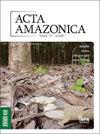Kleptoparasitism attempt on a greater grison (Galictis vittata) by a white hawk (Pseudastur albicollis) in the Brazilian Amazon
IF 0.8
4区 环境科学与生态学
Q4 ECOLOGY
引用次数: 0
Abstract
ABSTRACT Facultative kleptoparasites face the risk of trying to steal food resources from competitors. This type of interaction is little known, but anecdotal observations indicate that birds of prey may take advantage of their accurate sight to detect the best opportunities for kleptoparasitism. We recorded a camera trap video of an attempt of kleptoparasitism by the white hawk, Pseudastur albicollis, that tried to steal food from a greater grison, Galictis vittata, in a recently selectively-logged forest site in central Brazilian Amazonia. The attempt was unsuccessful as the greater grison responded aggressively to the attack. The event occurred in a linear clearing, which may have increased the bird’s ability to detect its potential host. Kleptoparasitic interactions are difficult to detect in forest environments. Recording opportunistic kleptoparasitic interactions in tropical forests may not only depend on the increasing use of camera traps, but also on habitat conditions that facilitate the detection of potential hosts.巴西亚马逊地区,一只白鹰(Pseudastur albicollis)企图在一只更大的grison (Galictis vittata)上偷窃寄生
兼性偷窃寄生虫面临着试图从竞争对手那里窃取食物资源的风险。这种类型的相互作用很少为人所知,但轶事观察表明,猛禽可能会利用它们精确的视力来发现偷窃寄生的最佳机会。在巴西亚马逊中部最近被选择性砍伐的一处森林中,我们录下了一段摄像机陷阱,记录了白鹰(Pseudastur albicollis)试图从一只更大的灰鹰(Galictis vittata)那里偷取食物的行为。这一企图没有成功,因为更大的监狱对袭击作出了激烈的反应。这一事件发生在一个线性的空地上,这可能增加了这种鸟发现潜在宿主的能力。在森林环境中很难发现盗寄生相互作用。在热带森林中记录机会性窃寄生相互作用可能不仅取决于越来越多地使用相机陷阱,还取决于有助于发现潜在宿主的栖息地条件。
本文章由计算机程序翻译,如有差异,请以英文原文为准。
求助全文
约1分钟内获得全文
求助全文
来源期刊

Acta Amazonica
PLANT SCIENCESECOLOGYZOO-ECOLOGY
CiteScore
1.70
自引率
0.00%
发文量
34
审稿时长
22 weeks
期刊介绍:
Acta Amzonica is a multidisciplinary, peer-reviewed, open access, free-of-charge scientific journal for research in and about the Amazon region, published since 1971 by the Instituto Nacional de Pesquisas da Amazônia - INPA, in Brazil.
The journal publishes quarterly issues containing articles and short communications in English across a broad range of disciplines, including Agronomy and Forestry, Animal Sciences and Fisheries, Biodiversity and Conservation, Biotechnology, Chemistry and Pharmacology, Environmental Sciences, Food Sciences, Geosciences, Health Sciences, Human and Social Sciences, and Materials Technology.
 求助内容:
求助内容: 应助结果提醒方式:
应助结果提醒方式:


